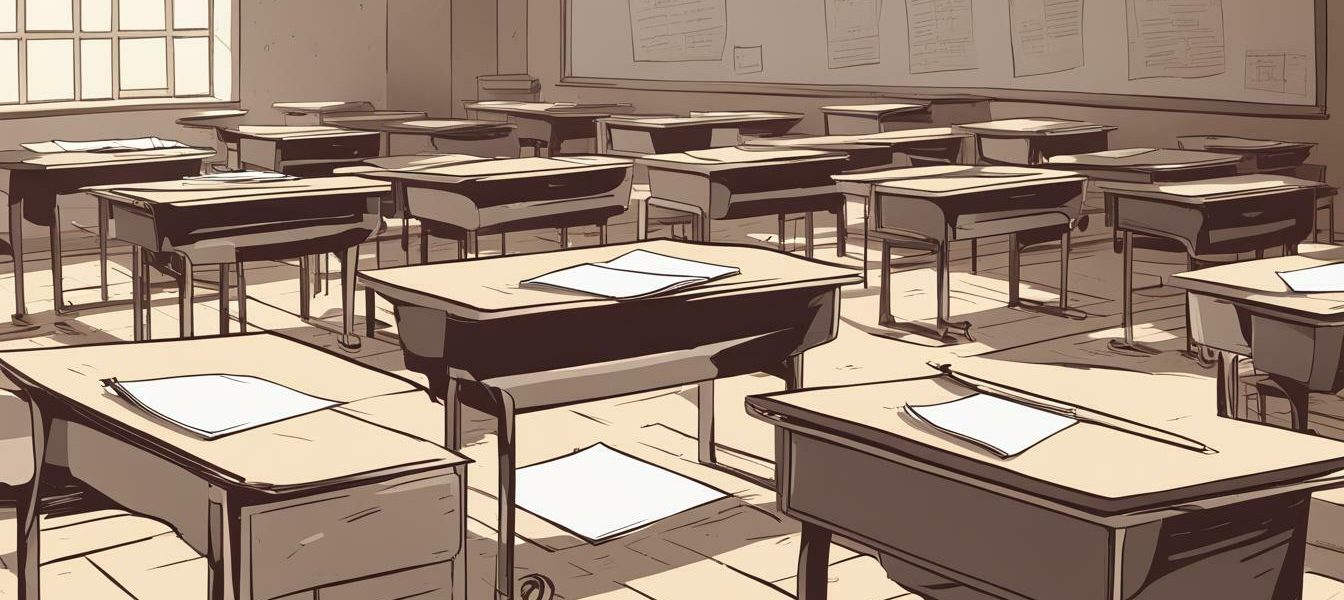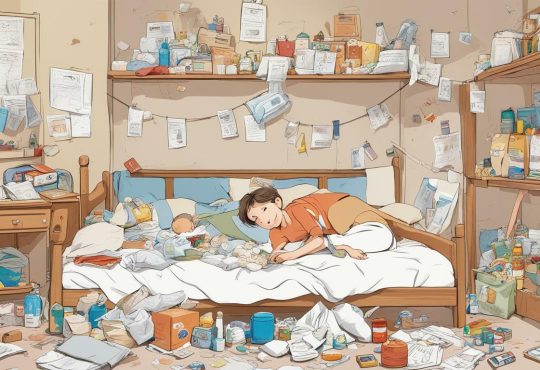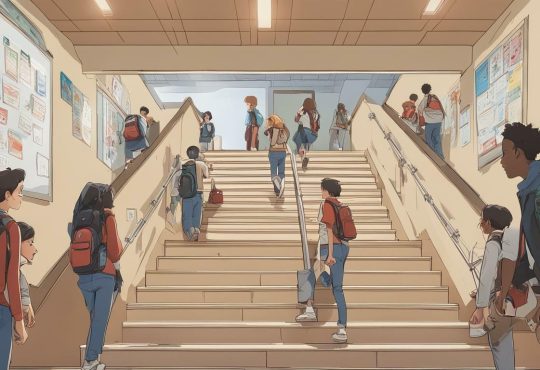
What Happens If You Fail A Class In Highschool
Falling behind in a class is not uncommon, but what happens if you fail a class in high school? Failing a class can have consequences that extend beyond the classroom. This article will explore the potential academic and personal ramifications of failing a class and highlight the various options available to students who find themselves in this situation.
Key Takeaways:
- Failing a class can impact a student’s GPA and progress towards graduation.
- Students who fail a class may be required to repeat a grade or take additional classes.
- Various credit recovery options are available to students who fail a class, including summer school and online courses.
- Seeking academic support can help students who are struggling in a particular class.
- Failing a class can have implications for college admissions and future career goals.
Understanding the GPA Impact
One of the biggest consequences of failing a class in high school is how it affects a student’s GPA. GPA, or Grade Point Average, is calculated by averaging all of a student’s grades together. Failing a class can significantly lower a student’s GPA, making it more difficult to maintain good academic standing.
The impact of a failed class on one’s GPA depends on a few factors, including the number of credits the class is worth and the current GPA. For example, failing a 1-credit elective class will have less impact on GPA than failing a 4-credit core class. Additionally, the lower the current GPA, the more significant the impact of a failed class will be.
To calculate the impact of a failed class on GPA, students can use an online GPA calculator. These calculators typically require information such as the current GPA, the number of credits in the failed class, and the letter grade that was earned. The calculator will then provide an estimated new GPA.
It’s important to note that GPA plays a significant role in college admissions and scholarship opportunities. Failing a class and subsequently lowering one’s GPA can limit these opportunities. However, there are ways to recover from a low GPA and improve academic standing.
Repeating a Grade Due to Failing a Class
Failing a class in high school can have serious academic consequences, including the possibility of repeating a grade. If a student fails a required course, such as English or math, they may be required to repeat the entire grade in order to fulfill graduation requirements and move on to the next level.
Repeating a grade can have both academic and social implications. Students may feel embarrassed or ashamed of having to repeat a grade, and they may struggle to adjust to a new group of classmates. Additionally, repeating a grade may negatively impact a student’s confidence and motivation, making it even more difficult to succeed academically in the future.
However, repeating a grade can also be an opportunity for students to address areas of weakness and improve their academic skills. Students who repeat a grade may benefit from additional support and resources, such as tutoring or extra help sessions. By taking advantage of these resources, students can build a stronger academic foundation and increase their chances of success in future courses.
It’s important for students and their families to carefully consider the decision to repeat a grade. While it may be tempting to simply move on and try to catch up later, repeating a grade can ultimately provide a stronger academic foundation and improve a student’s chances of long-term success.
Graduation Requirements After Failing a Class
One of the biggest concerns for high school students who fail a class is how it will affect their progress towards graduation. While graduation requirements vary by state and district, most high schools require students to earn a certain number of credits in different subject areas to graduate.
If a student fails a required class, they may need to retake the class or take an alternative course in order to meet graduation requirements. This can be especially challenging for students who have already maxed out their course load or who struggle academically.
| Graduation Requirements | Typical Credits |
|---|---|
| English/Language Arts | 4 |
| Math | 3-4 |
| Science | 3-4 |
| Social Studies | 3-4 |
| World Languages | 2-3 |
| Physical Education | 1-2 |
| Electives | 6-8 |
In addition to meeting credit requirements, students may also need to pass certain classes in order to graduate. For example, some high schools require students to pass a state-mandated test in order to receive a diploma.
If a student fails a required class, it is important to work with their guidance counselor to understand their options for meeting graduation requirements. This may involve retaking the class during the regular school year, taking a summer school course, or enrolling in an alternative program.
High School Credit Recovery Options
If you fail a class in high school, don’t panic. There are many credit recovery options available to help you get back on track.
One option is summer school. Many high schools offer summer school programs where you can retake failed classes and earn the credits you need to graduate. Summer school classes are often less crowded than regular classes, giving you more individualized attention and support from your teachers.
Another option is online courses. Many reputable online schools offer credit recovery courses that you can take from the comfort of your own home. These courses are self-paced, so you can work at your own speed and on your own schedule.
Alternative programs are also available. These programs are designed for students who need a different approach to learning. They often feature smaller class sizes, more individualized attention, and a more hands-on approach to education.
It is important to talk to your guidance counselor or academic advisor to find the credit recovery option that is right for you. They can help you explore your options and choose the program that will best meet your needs.
“Don’t feel like you’re alone in this process. There are many options available to you and people who want to help you succeed.” – John, High School Guidance Counselor
Academic Support for Students Who Fail a Class
Failing a class can be a challenging and overwhelming experience for students. It’s essential to seek academic support to ensure that students have the necessary resources to succeed in their studies. There are several options available for students who need additional help after failing a class.
One of the most effective ways to seek academic support is by talking to the teacher. Most high schools have teachers who offer extra help sessions outside of class to assist students who need additional help. These sessions are an opportunity for students to ask questions and receive clarification on difficult topics.
Another option is to seek tutoring services. Tutoring can be a highly effective one-on-one or group support option for students who struggle in a specific subject. Many high schools have tutoring programs, but students can also work with private tutors. Additionally, online tutoring services are another convenient and accessible option for students who prefer virtual support.
If a student needs more extensive academic support, they can consider enrolling in academic support programs. These programs are specifically designed to help students who are struggling to catch up with their peers. They can provide one-on-one support, intensive instruction, or specialized curriculum to help students get back on track.
Lastly, students can reach out to their high school guidance counselor for support. Guidance counselors can assist students in creating a plan for academic success, accessing resources, and identifying additional support options. They can also provide students with emotional support and guidance during challenging times.
In summary, failing a class can be a difficult experience for students. However, it’s crucial to seek academic support to ensure that students have the necessary resources to succeed in their future studies. Whether it’s working with a teacher, tutor, or enrolling in an academic support program, there are numerous options available for students who need additional help after failing a class.
How Failing a Class Affects College Admissions
Failing a class in high school can have significant implications for a student’s college admissions prospects. Colleges and universities typically place a strong emphasis on a student’s academic record, including their grades and GPA. As a result, failing a class can negatively affect a student’s academic transcript, potentially impacting their chances of being accepted into their desired college or university.
In addition to the impact on a student’s transcript, failing a class can also affect their ability to meet GPA requirements for college admissions. Many colleges and universities have minimum GPA requirements that students must meet in order to be considered for admission. Failing a class can lower a student’s GPA and make it more challenging to meet these requirements.
The Importance of Academic Honesty
It is also important to note that some colleges and universities place a strong emphasis on academic honesty. If a student fails a class due to academic dishonesty, such as plagiarism or cheating, this can have severe consequences for their college admissions prospects. In addition to potentially affecting their transcript and GPA, academic dishonesty can also call into question a student’s character and integrity.
Options for Addressing Failed Classes
Despite the potentially negative consequences of failing a class, there are options available for students who find themselves in this position. For example, students may be able to retake the class to improve their grade and GPA. Additionally, some schools offer credit recovery options, such as summer school or online courses, for students who need to make up failed classes.
It is also important for students who fail a class to seek out academic support to ensure they are better prepared for future coursework. Tutoring, extra help sessions, and other academic resources can help students address areas of difficulty and improve their overall academic performance.
Ultimately, while failing a class can have negative consequences for college admissions, it is not the end of the road. By taking advantage of available resources and working to improve their academic performance, students can still achieve their college and career goals.
Retaking a Class in High School
If a student fails a class in high school, they may need to retake the class to make up the credit and fulfill graduation requirements. Fortunately, most high schools offer opportunities for students to retake classes they have failed.
The process for retaking a class may vary between schools, but typically involves enrolling in the class again during the next available term or semester. It is important to note that some schools may limit the number of times a student can retake a class, so it is crucial to discuss the options with a guidance counselor or academic advisor.
When retaking a class, students should also consider the potential impact on their GPA. In some cases, retaking a class may replace the previous grade on the student’s transcript, resulting in an improved GPA. However, this may not always be the case, so it is important to understand the school’s policies on GPA calculations.
It is also important to note that retaking a class may require additional time and effort outside of regular school hours. Students may need to attend extra help sessions or seek academic support to ensure success in the class. However, the benefit of fulfilling graduation requirements and avoiding academic consequences may make the extra effort worthwhile.
Academic Consequences of Failing a Class
Failing a class in high school can have academic ramifications that extend beyond the immediate consequences of needing to retake the class or repeating a grade. Here are a few academic consequences to consider:
- Missing Prerequisites: Many high school courses have prerequisites that must be completed before a student can enroll. Failing a required prerequisite course can delay progress towards graduation and limit future academic options.
- Impact on College Goals: For students with aspirations of attending college, failing a class can be a significant setback. Many colleges have minimum GPA requirements for admission, and failing a class can negatively impact a student’s GPA.
- Career Goals: In addition to college goals, failing a class can also impact future career opportunities. Some careers require a certain level of academic achievement, and a poor academic record in high school can limit those options.
It is important for students to understand the potential academic consequences of failing a class and take steps to avoid them. Seeking academic support, developing strong study habits, and prioritizing academic success can all contribute to a successful high school career.
Conclusion: Navigating High School Successfully
In conclusion, failing a class in high school can have significant consequences, such as a lower GPA and potential delays in graduation. However, there are various options available to students who find themselves struggling in a particular class.
It’s important to seek academic support and explore credit recovery options if necessary, as well as considering the possibility of retaking the class. It’s also crucial to keep in mind the potential impact on college admissions and academic goals and take proactive steps to mitigate any negative effects.
Remember, high school is a time to learn and grow, and setbacks are a natural part of the process. By staying focused and seeking support when needed, students can navigate high school successfully and achieve their academic goals.



